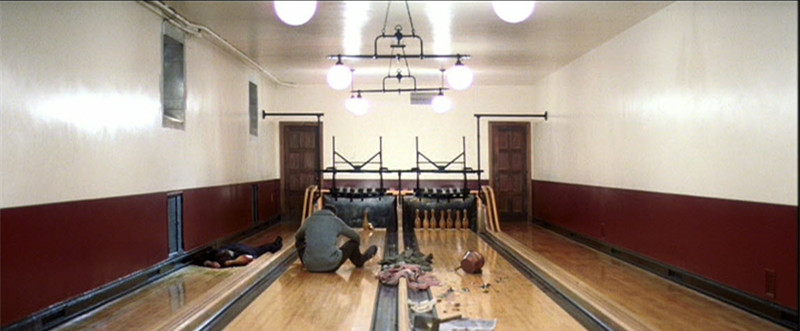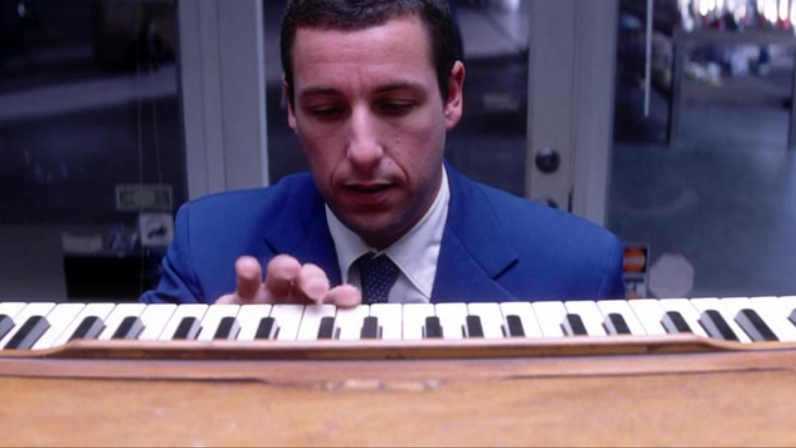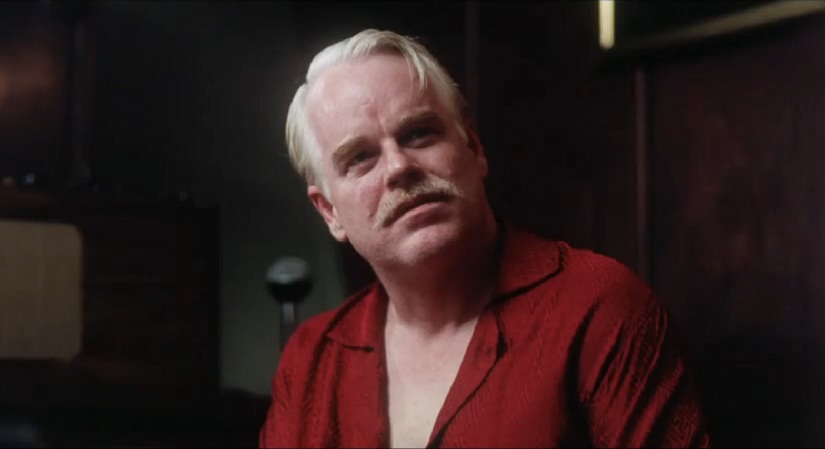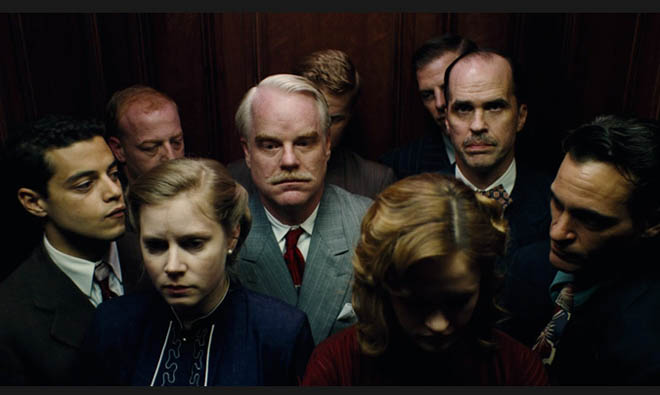5. Decadence and morality

Films that demonstrate this: Hard Eight, Boogie Nights, Magnolia, There Will Be Blood, The Master
Best example: There Will Be Blood
All people are flawed. Kindness can mask greed and ambition is corruption. If one were to study Anderson’s protagonists, these are conclusions one could draw all too easily. What about the twisted moral nature of Sydney, whose guilt at the murder of a man led to the “adoption” of his son an act to redeem? Maybe so, if he didn’t leave the bodies of friends in his wake to cover up his reasons.
Or Dirk Diggler, an innocent kid turned porn legend whose ambition leads to jealously, pride, drugs, and his own downfall. In “Magnolia”, all of the characters are broken; one destroys women and their sense of self for sex, one is a drug addict, one may be a rapist, one is a cheater who abandoned his dying wife and child, and one is a woman who married a man for his wealth only to realize she loves him as he lies on his deathbed. “The Master” follows a violent, alcoholic sex addict who comes under the influence of a cult leader, who may be manipulating everyone who follows him.
However, it is in his opus, “There Will Be Blood”, that thrusts this idea into our hearts. The ideas of decadence, greed, ambition, and corruption are embodied in their entirety through Daniel Plainview, who symbolically spurns religion and embraces the pursuit of liquid gold.
Plainview is a man who adopts a child to convince people to sell him all they’ve got, a man who denies religious people the opportunity to bless the well that their money built, and a man who throws away his son when he is no longer of any benefit. Books could be written on the masterful exploration of the hopeless nightmare that is Plainview’s continued fall into the black hole of bitter and isolating madness.
Perhaps Daniel Plainview is one of the greatest characters to ever be captured on film; a man with no cathartic resolution and no glorified moral rises. Any attempts he makes to claim back morality (“I have abandoned my child”) crumble into cinders at the thought of a lost profit (“Bastard from a basket”).
Plainview is a godless man, one motivated entirely by avarice, but he is also human. Perhaps that is the most terrifying aspect of his character; he has no resemblance to anyone we could ever know, but there’s a bit of Daniel Plainview in all of us.
4. Salvation and redemption

Films that demonstrate this: Hard Eight, Magnolia, Punch-Drunk Love, There Will Be Blood, The Master
Best example: Punch-Drunk Love
Not all of Anderson’s dips into immorality are condemning; he often presents the notion of redemption as holistically achievable.
It is hard to pick a film for which this stands out most; more often than not, it is most clearly seen through the ‘Angel’. I dub the title ‘Angel’ to the character in Anderson’s films who seeks to only do good; the light in the life of the protagonist, and their absence of acceptance, is what often heals the void of immorality in his protagonists.
In “Boogie Nights”, it can be seen as Julianne Moore’s Amber; a maternal figure to almost all characters in the film, despite suffering at the hands of her own vices.
In “Magnolia” it is two figures: John C. Reilly’s Jim Curring and Philip Seymour Hoffman’s Phil Parma. This time, both are entirely holistic characters, aiming to do good for the sake of doing good by those around them. Those characters they influence (Claudia Gator and Frank Mackey, primarily) undergo a defining resolution to their characters.
The ‘Angel’ is clearest in “Punch-Drunk Love”; Emily Watson’s Lena Leonard completely changes Barry Egan’s life, and everything from juxtaposing costuming, accent, demeanor, and lighting highlight her angelic nature. She saves Egan from the life he had led until that point, and as he puts it himself, “I have a love in my life and that makes me stronger than you could ever imagine.”
3. Familiar faces

Actors who have appeared in more than one of his films: Philip Seymour Hoffman, Julianne Moore, Philip Baker Hall, Luis Guzman, Joaquin Phoenix, John C. Reilly
Actor that has appeared in the most: Philip Seymour Hoffman
Although he doesn’t play favourites like the Coen brothers and Quentin Tarantino, Anderson loves forming bonds with his performers. Especially in his first four films, Anderson has loved keeping a collection of close-working actors; interestingly, not a single one of his lead performers, other than Joaquín and Baker Hall, has ever reprised a role in his films.
With colorful supporting actors, Anderson’s casts are littered with half-famous stars and no performer is more clearly associated with his work than Philip Seymour Hoffman.
Anderson once said that when watching “Scent of a Woman” as a teen, he saw Hoffman step on screen and it was “love at first sight.” From that moment on, he said, “all I wanted to do was work with him.” From his bit part in “Hard Eight”, he worked with him in all his films except “There Will Be Blood” until Hoffman tragically passed away.
There is a kind of magnetic chemistry between Hoffman and Anderson that makes his every role so beautiful, so perfect, and so enchanting, that it has been replicated perhaps twice in cinematic history.
From his cocky gambler in “Hard Eight”, his awkward gay lighting man in “Boogie Nights”, his good-natured and loving nurse in “Magnolia”, his “porno king” of Ohio in “Punch-Drunk Love”, and perhaps his greatest performance in a history of brilliance as Dodds in “The Master”, all of his performances add some of the most vibrant and poignant moments in Anderson’s body of work, and we can only dare to imagine if things had ended differently, the continued brilliance their relationship would have provided.
2. The master and apprentice

Films that demonstrate this: Hard Eight, Boogie Nights, Magnolia, There Will Be Blood, The Master, Inherent Vice
Best example: The Master
While the protagonist’s “special thing” often propels their story forward into a complex and chaotic mosaic of characters, it isn’t until the master develops and harnesses the protagonist that this truly takes place.
This relationship could perhaps be telling of Anderson’s own childhood anxieties, as it is entirely paternal; the bond between master and apprentice in Anderson’s works always stimulate from a father figure reaching out.
In “Hard Eight”, we uniquely approach from the master’s perspective, guiding his youthful and naive pupil whilst Burt Reynolds’ Jack Horner obviously takes Dirk into the vast and exciting world of porn in “Boogie Nights”.
In “Magnolia”, we sense a lack of paternal care, characters lost to their parents, and whose anxieties and sufferings stimulate from this lack of guidance. The most obvious is Claudia, who lives a sex and drug-addled life of instability due to the sufferings inflicted on her by her father, and in Frank, whose career stimulates (bizarrely) from the abandonment of his father in his youth.
“There Will Be Blood” tracks this in two parts; the father and son, but also. in brotherhood. Despite this, Daniel Plainview is seen as an incapable mentor and as a result, the child is deafened and the brother is killed.
In ‘Inherent Vice”, Anderson projects a radically different presentation of his theme: the concept of ownership, the “master” of an individual and not so much the “teacher”. Shasta gives a chilling and captivating monologue about the attraction of power; how a man’s power and dominance could so fully consume her. She liked being his puppet and tool, and the fear of being thrown away made it all the more exciting.
Perhaps just as pervasive in “Inherent Vice” is the notion of no one claiming ownership or mastery. No singular character holds power in this film; there is no guide and there is no real resolution. There is a lack of presence that could be seen as a mentor simply because… there is no such thing? Shasta and Doc ride off into the empty world in search of nothing.
However, no clearer are the fundamentals of the master and apprentice relationship than in “The Master” (obviously). Consider the void of control and stability within Freddie’s life before Lancaster appears before him, fading in with the light like a mirage. He sees him and he pities him, offering a chance at salvation. Lancaster says, in their conclusion, that perhaps they fought together in a past life; a bond of brotherhood in war.
Freddie fills his voided life with an unquestioning devotion to the man, not the faith. But Anderson doesn’t stop there; mastery, what is it? To Freddie, it must be corporeal, for when he desperately tries to follow the cult’s tenets and beliefs, he finds no solace, and he abandons them. However, to the follows of the cult, is it faith and belief in a higher power; it does not matter what and it does not matter how. All that matters is that it gives them comfort.
Lancaster believes no one lives without a master; his is his wife, whose control is sexual, and hers is ironically to the cause. Control, dominance, ownership, and faith are circular to Anderson. One leads to the other and there is no breaking that chain. But Freddie does; he drives off into the distance after denying a final connection with Lancaster. Does this mean that so too, can we?
1. Family

Films that demonstrate this: Hard Eight, Boogie Nights, Magnolia, Punch-Drunk Love, There Will Be Blood, The Master, Inherent Vice
Best example: Magnolia, Punch-Drunk Love
Is there other any theme that has been more powerfully or consistently portrayed in Anderson’s work than family?
In each of his films, there is some sort of family, be it a literal bond in blood or a metaphorical family, and within each of these families there is a dysfunctional nature to their relationship, which almost always results in pain.
In “Hard Eight”, it is the hollow foundation that Sydney establishes his father-son relationship upon; he killed the man’s real father, after all.
In “Boogie Nights”, we see two families: the conservative and controlling mother, a figure who destroys her son’s room in a fit of rage, and a family he joins, the patriarch Jack Horner and the matriarch Amber Waves. But this family is twisted in vision, as Dirk’s first on-screen shoot is a sex scene with Amber; Oedipus allusions are vividly drawn and the facade is highlighted.
In “There Will Be Blood”, the relationship with family is presented entirely as fake and hopeless; his son is adopted and cast aside, and his brother is killed. The cost of success? Or the nature of Plainview?
In “The Master”, we see family as a cult, with Lancaster at its head as both a brother and a father; however, the matriarch despises Freddy and the family follows a faith built on lies. Another flawed foundation that Freddie cannot immerse within; he abandons his family because they had never embraced him.
“Inherent Vice” takes this differently, with Owen Wilson’s Coy Harlingen as a secondary character, abandoning his family because of circumstances out of his control. Coy and his wife were both drug addicts with their child suffering due to this, but the film doesn’t vilify the mistakes of the father, as many of his other works do. Instead, Coy seeks a safe return to his film, to complete a whole and reconnect with his love and child.
In “Punch-Drunk Love”, we clearly see the end result of a dysfunctional family; Barry cannot maintain a stable life in the world with constant mockery and abuse by his seven sisters. He isolates himself in an isolated garage business on a dead end street far from the real world; he is so tightly wound up that when he slams an “unbreakable” plunger into the table and it shatters all over him, he doesn’t react. He moves mechanically hidden inside himself until his sister’s chatter becomes unbearable; he smashes in their backyard sliding doors and cries.

However, “Magnolia” can be considered the ultimate depiction of family and neglectful parenthood. Each character has suffered at the hands of a parent or inflicted suffering upon a child. Each one lives in decadence, or suffers some karmic punishment as a result.
Melora Walter’s Claudia abuses drugs, living as a shell of herself due to the torment and possible sexual abuse by her father. Her father, Jimmy Gator, likewise suffers – from cancer and abandonment. He loses everything over the course of the film, but Anderson doesn’t condemn him from the viewer’s perspective; we see a human we are fit to judge for ourselves. We know he suffers and we feel sorrow when he loses everything, despite what we know of his actions.
Then consider Frank T.J. Mackey, who changed his name out of shame and anger at his father. He leads a misogynistic life teaching men how to demoralize and manipulate women for sex, but he too is the victim; his father abandoned him at 14 years old to care for his mother, who was dying of cancer. Now his father is also dying of cancer and he longs to reconnect, but there’s too much healing to do and not enough time. He is left dying in his regret and Frank is left hollow, his anger exerted but his emotional compensation void.
Finally, consider the dual lives of Quiz Kid Donnie Smith and Stanley. Donnie, who won the iconic game show as a child, lost all his revenue, which was stolen by his parents as he lives a bitter life stuck in the past, dwelling on what could have been. Stanley is a child genius; he is used by his father who may love him but does not consider him.
Stanley is the only character we witness who has the capability to break the cycle; he maintains a holistic level of understanding as to the nature of the world around him and what he must do.
“You have to be nicer to me, dad.” A statement muttered by Stanley in the dead of night seems to be a plea to the fathers of the film, and the parents of our world, to break the cycle for the children who suffer.
Anderson paints a breathtaking mosaic of the pain of neglect, which is considered one of the most common and damaging forms of parent abuse, but Anderson does not condemn these actions; instead, he teaches the consequences.
Donnie may never move on, but Claudia will. Frank may never truly resolve the buried issues he holds, but Stanley might finally break the pattern. And Jimmy Gator is abandoned and denied an easy exit by an act of God, left as a warning perhaps by Anderson as to the consequences of our actions.
Because it is not dangerous to confuse children with angels. That perhaps may be the most pervading message from his masterful mosaic.